小学英语单词分类+语法时态汇总(附练习题)
译林版小学英语四种时态复习-附练习及答案
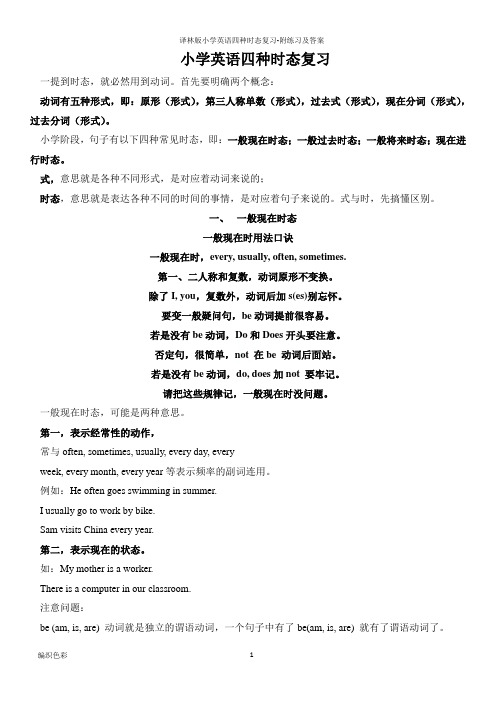
小学英语四种时态复习一提到时态,就必然用到动词。
首先要明确两个概念:动词有五种形式,即:原形(形式),第三人称单数(形式),过去式(形式),现在分词(形式),过去分词(形式)。
小学阶段,句子有以下四种常见时态,即:一般现在时态;一般过去时态;一般将来时态;现在进行时态。
式,意思就是各种不同形式,是对应着动词来说的;时态,意思就是表达各种不同的时间的事情,是对应着句子来说的。
式与时,先搞懂区别。
一、一般现在时态一般现在时用法口诀一般现在时,every, usually, often, sometimes.第一、二人称和复数,动词原形不变换。
除了I, you,复数外,动词后加s(es)别忘怀。
要变一般疑问句,be动词提前很容易。
若是没有be动词,Do和Does开头要注意。
否定句,很简单,not 在be 动词后面站。
若是没有be动词,do, does加not 要牢记。
请把这些规律记,一般现在时没问题。
一般现在时态,可能是两种意思。
第一,表示经常性的动作,常与often, sometimes, usually, every day, everyweek, every month, every year等表示频率的副词连用。
例如:He often goes swimming in summer.I usually go to work by bike.Sam visits China every year.第二,表示现在的状态。
如:My mother is a worker.There is a computer in our classroom.注意问题:be (am, is, are) 动词就是独立的谓语动词,一个句子中有了be(am, is, are) 就有了谓语动词了。
句子中不能同时出现两个谓语动词。
不少同学经常出这样的错误:The boy is often eats hamburgers.(错)应当改为:The boy often eats hamburgers.二、现在进行时态正在进行时态口诀现在分词用途多,进行时态不用说。
小升初英语四大时态复习讲解及真题专项练习含答案
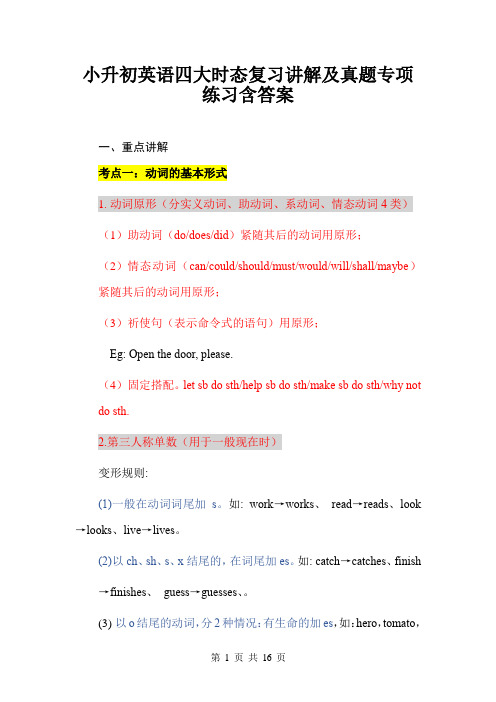
小升初英语四大时态复习讲解及真题专项练习含答案一、重点讲解考点一:动词的基本形式1.动词原形(分实义动词、助动词、系动词、情态动词4类)(1)助动词(do/does/did)紧随其后的动词用原形;(2)情态动词(can/could/should/must/would/will/shall/maybe)紧随其后的动词用原形;(3)祈使句(表示命令式的语句)用原形;Eg: Open the door, please.(4)固定搭配。
let sb do sth/help sb do sth/make sb do sth/why not do sth.2.第三人称单数(用于一般现在时)变形规则:(1)一般在动词词尾加s。
如: work→works、read→reads、look →looks、live→lives。
(2)以ch、sh、s、x结尾的,在词尾加es。
如: catch→catches、finish→finishes、guess→guesses、。
(3)以o结尾的动词,分2种情况:有生命的加es,如:hero,tomato,potato;没有生命的加s,如:radio,photo。
(4)以辅音字母加y结尾的动词,变y为ies。
如: fly→flies、study →studies、carry→carries.(5) 不规则变化。
如: have→has ,are→is,were→was3.现在分词(用于现在进行时)变形规则:(1)一般在动词后加ing。
如: work→working、read→reading、look →looking、wait→waiting。
(2)以不发音的e结尾的动词,去掉e,再加ing。
如: smile→smiling、move→moving、take→taking、write→writing。
(3)以重读闭音节结尾的且词尾只有一个辅音字母的,双写这个辅音字母加ing。
如: sit→sitting、stop→stopping、cut→cutting、run →running、swim→swimming.(4)少数几个以ie结尾的动词,将ie改为y加ing。
(完整版)小学英语四种时态练习题丁晓彤
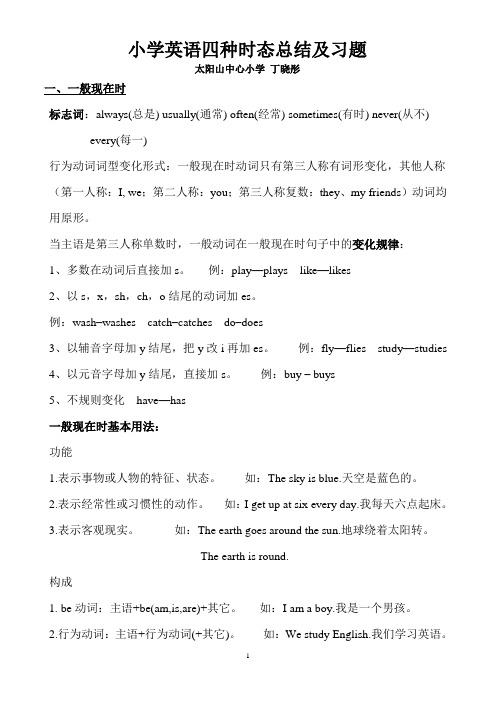
小学英语四种时态总结及习题太阳山中心小学丁晓彤一、一般现在时标志词:always(总是) usually(通常) often(经常) sometimes(有时) never(从不) every(每一)行为动词词型变化形式:一般现在时动词只有第三人称有词形变化,其他人称(第一人称:I, we;第二人称:you;第三人称复数:they、my friends)动词均用原形。
当主语是第三人称单数时,一般动词在一般现在时句子中的变化规律:1、多数在动词后直接加s。
例:play—plays like—likes2、以s,x,sh,ch,o结尾的动词加es。
例:wash–washes catch–catches do–does3、以辅音字母加y结尾,把y改i再加es。
例:fly—flies study—studies4、以元音字母加y结尾,直接加s。
例:buy – buys5、不规则变化have—has一般现在时基本用法:功能1.表示事物或人物的特征、状态。
如:The sky is blue.天空是蓝色的。
2.表示经常性或习惯性的动作。
如:I get up at six every day.我每天六点起床。
3.表示客观现实。
如:The earth goes around the sun.地球绕着太阳转。
The earth is round.构成1. be动词:主语+be(am,is,are)+其它。
如:I am a boy.我是一个男孩。
2.行为动词:主语+行为动词(+其它)。
如:We study English.我们学习英语。
句型肯定句:A. be动词:主语+ be + 其它成分如:He is a worker.B.行为动词:主语+动词(注意人称变化) +其它成分如:We like the little cat.否定句:A. be动词:主语+ be + not +其它成分如:They are not students.B.行为动词:主语+助动词(do/does) + not +动词原形+其它成分如:We don’t like the little cat.一般疑问句:A. be动词:Am / Is /Are +主语+ 其它成分如:Are you a teacher? Yes, I am. / No, I am not.Are they students of your school?Yes they are / No they aren’t.B.行为动词:助动词(Do/Does)+主语+动词原形+ 其它成分如:Do you like it? Yes, I do. / No. I don’t .Does he(she) like it? Yes, he( she )does. / No, he ( s he )doesn’t.特殊疑问句:疑问词+ 一般疑问句A. be动词:How many students are there in your school?B.行为动词:What do you usually do on Sunday?一般现在时动词be和have的变化形式1.动词Be 用法:第一人称单数用am,第三人称单数用is,其它人称用are。
小学英语四大时态总结及练习题
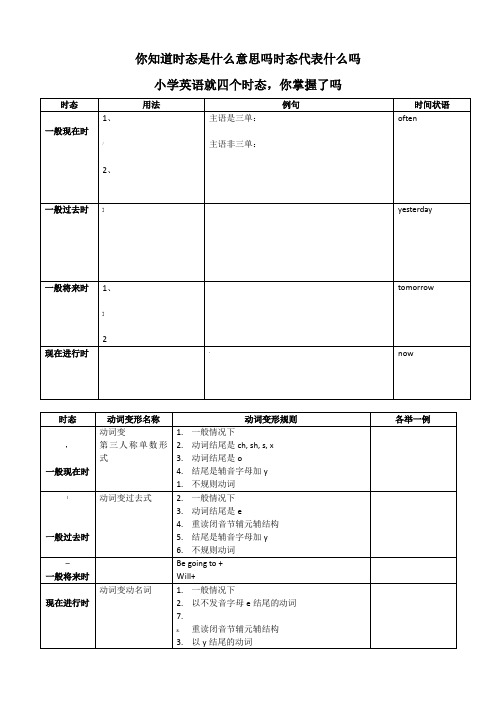
你知道时态是什么意思吗时态代表什么吗小学英语就四个时态,你掌握了吗你能发现它们之间的共同点和不同点吗勤加练习,百战不殆I.把下列动词变为第三人称单数形式。
1. clean--2. go--3. have--4.do-6. fly--7. come-- brush-9. watch-- 10. study-- 11. ask--(13. swim-- 14. catch-- 15. write--16. eat-- 17. make-- 18. paint—19. learn-- 20. phone-- 21. run—22. hop-- 23. sing-- 24. pick—II.把下列动词变成过去式is\am________ fly______ plant________are________ drink_________ play_______go________ make ______ does_________dance________ worry________ ask _____ taste_________ eat__________ draw________put ______ throw________kick_________ pass_______ do ________III.把下列动词变成动名词形式。
Wake________ make__________ come____________have____________!Take_________ leave__________ rid_________, regret__________, Begin________,cut________, get_________, hit_________, run_________, set_________, sit__________, spit__________, stop_________, swim________,beg_________, drop__________, fit_________, nod_________, dig___________, forget_________, travel_________visit_________Carry_________ enjoy___________ play ___________ study ________die_________ lie_________多加练习,百战不殆之时态篇一、用单词的正确形式填空:1.Mike _________ (do) his homework every day.2.There __________(be) some water in the glass.3.We like ________ (play) basketball after class.4.I like singing. I often _________(listen) to the music in the evening.5.【6.My grandma_________(watch) TV every day.二、判断句子的正误, 并改正。
小学英语语法时态归纳及练习(含答案解析)

英语时态归纳一、一般现在时:标志词:often(经常) sometimes(有时) always(总是) usually(通常) never(从不) every(每一)行为动词词型变化形式:一般现在时动词只有第三人称有词形变化;其他人称(第一人称:I, we;第二人称:you;第三人称复数:they、my friends)动词均用原形。
当主语是第三人称单数时,一般动词在一般现在时句子中的变化规律:1、多数在动词后加s:play—plays like—likes ,2、以s,x,sh,ch,o结尾的动词加es wash–washes catch–catches do–does3、以辅音字母加y结尾,把y改i再加es fly—flies study—studies4、以元音字母加y结尾,直接加s buy – buys5、不规则变化have—has一般现在时基本用法功能1.表示事物或人物的特征、状态。
如:The sky is blue.天空是蓝色的。
2.表示经常性或习惯性的动作。
如:I get up at six every day.我每天六点起床。
3.表示客观现实。
如:The earth goes around the sun.地球绕着太阳转。
The earth is round.构成1. be动词:主语+be(am,is,are)+其它。
如:I am a boy.我是一个男孩。
2.行为动词:主语+行为动词(+其它)。
如:We study English.我们学习英语。
句型肯定句:A.be动词:主语+ be + 其它成分He is a worker.B.行为动词:主语+动词(注意人称变化) +其它成分We like the little cat.否定句:A.be动词:主语+ be + not+其它成分They are not students.B.行为动词:主语+助动词(do/does) + not+动词原形+其它成分We don’t like the little cat.一般疑问句:A.be动词:Am / Is /Are +主语+ 其它成分Are you a teacher? Yes, I am. / No, I am not.Are they students of your school. Yes, they are / No they aren’t.B.行为动词:助动词(Do/Does)+主语+动词原形+ 其它成分Do you like it? Yes, I do. / No. I don’t .Does he(she) like it? Yes, he( she )does. / No, he ( she )doesn’t.特殊疑问句:疑问词+ 一般疑问句A.be动词:How many students are there in your school?B.行为动词:What do you usually do on Sunday?一般现在时动词be和have的变化形式1.动词Be 叫连系动词, 用法:第一人称单数用am,第三人称单数用is,其它人称用are。
小学四种时态试题及答案

小学四种时态试题及答案一、一般现在时1. 我每天上学。
A. go to schoolB. goes to schoolC. am going to schoolD. am going to go to school答案:A2. 他经常帮助别人。
A. He often help others.B. He often helps others.C. He often helped others.D. He often helping others.答案:B3. 我们喜欢游泳。
A. We like to swim.B. We likes to swim.C. We liked to swim.D. We liking to swim.答案:A二、一般过去时4. 昨天我去了图书馆。
A. I go to the library yesterday.B. I went to the library yesterday.C. I am going to the library yesterday.D. I go to the library yesterday.答案:B5. 他们上周看了电影。
A. They watch a movie last week.B. They watched a movie last week.C. They are watching a movie last week.D. They will watch a movie last week.答案:B6. 她昨天买了一本书。
A. She buy a book yesterday.B. She bought a book yesterday.C. She is buying a book yesterday.D. She will buy a book yesterday.答案:B三、一般将来时7. 明天我要去看医生。
A. I am going to see a doctor tomorrow.B. I go to see a doctor tomorrow.C. I went to see a doctor tomorrow.D. I will go to see a doctor tomorrow.答案:A8. 他们将要参加比赛。
(完整版)小学英语四大时态总结及练习题

你知道时态是什么意思吗?时态代表什么吗?小学英语就四个时态,你掌握了吗?你能发现它们之间的共同点和不同点吗?勤加练习,百战不殆I.把下列动词变为第三人称单数形式。
1. clean--2. go--3. have--4. do-5.play--6. fly--7. come-- brush-9. watch-- 10. study-- 11. ask-- 12.answer--13. swim-- 14. catch-- 15. write--16. eat-- 17. make-- 18. paint—19. learn-- 20. phone-- 21. run—22. hop-- 23. sing-- 24. pick—II.把下列动词变成过去式is\am________ fly______ plant_____ are________ drink_________play_______ go________ make ______ do_________dance________ worry_____ask _____ taste_________ eat________draw________ put ______ throw________ kick_________pass_______ do ________III.把下列动词变成动名词形式。
wake________ make__________ come____________ have____________take_________ leave__________ rid_________, regret__________,begin________ cut________, get_________, hit_________, run_________, set_________, sit__________, spit__________, stop_________, swim________, beg_________, drop__________, fit_________, nod_________, dig___________, forget_________, travel_________ visit_________ carry_________ enjoy___________ play ___________ study _____die_________ lie_________多加练习,百战不殆之时态篇一、用单词的正确形式填空:1.Mike _________ (do) his homework every day.2.There __________(be) some water in the glass.3.We like ________ (play) basketball after class.4.I like singing. I often _________(listen) to the music in the evening.5.My grandma_________(watch) TV every day.三、选择最佳的答案:1. ____Alice often play the piano? No, she _____. A. Do; do B. Does; does C. Does; doesn't2. ___ your penpal __ in Beijing? A. Do; live B. Do; lives C. Does; live3. Tom and Mike __ very excited, they will take a trip. A. is B. are C. am4. I like ________ very much. What about you? A. dance B. danced C. dancing5. The kite ____ a bird. A. look like B. is looking C. looks like6. Bill and I ___ good friends. A. is B. are C. am7. Sandy often ___ his homework on Sundays . A. do B. does C. did8. What do you usually do on the weekend? I __________.A. went swimmingB. go swimmingC. visited grandparents9. What do you usually do on your holiday? I usually __________.A. saw elephantsB. sing and danceC.took picture10. I ____ a student. I go to school ____bus every day. A. is; by B. am; on C. am; by11. I ____ a brother. She ____ a sister. A. have; has B. has; has C. have; have12. You ____ a student. He ____ a teacher. A. is; is B. are; is C. are; are13. He always _____ football games. A. watches B. watch C. doesn't14. My best friend _____ shells. A. collects B. collect C. often15. She doesn’t _____ listening to the music. A. often B. like C. likes16. My mother and I ___ always watch romantic films. A. doesn’t B. don’t C. do17. ---When _____ he get home on Friday?----He gets home at four on Friday. A. do B. does C. did18.Summer _________ spring.A. comes afterB. comes ines before二、用单词的适当形式填空:1. look! Chen Jie and Mike are ___________(sing)now.2. The small bear is _____________ (climb) the tree.3. Mike is ________________ (draw) picture.4. She is ________________ (do) the dishes.5. My brother __________ (make) kites now.6. My father is ___________ (read) a newspaper in living room.7. Ted is __________(answer) the phone.8. My uncle is ____________ (drive) a car.9. The students are ______________(listen) to their teacher carefully.10. Chen Jie is _________(wash) clothes.11. His sister _______ (be) writing an e-mail.12. We ______(be) cleaning the classroom now.13. I____ (be)working on my computer.14. They _____ (be)playing basketball.15. Look, The tiger ________ __________(walk).16. Look, The elephants ______ _____________(drink) water with their trunk.17. Look, The monkeys ________ ___________ (swing).18. Peter _________ ______________(take) pictures now.19. They _____ ________(take)up the apples now.20. We _______ ________(catch) butterflies now.三、选择正确答案1. Every one ____ to their teacher in the classroom. A. are listening B. is listening C. listen2. They are singing and ___ together at the party now. A. dance B. danced C. dancing3. Listen! The birds ____. A. is singing B. are sing C. are singing4. Look! The kite ___ in the sky. A. fly B. flies C. is flying5. They ____ riding a forse. A. is B. are C. am6. Kate ____ playing chess. A. am B. is C. are7. Are you washing clothes? A. Yes, you are B. Yes, I am C. No, I am8. Is he ____ TV?Yes, he is. A. watch B. watching C. not9. ____ they taking pictures.? Yes, they are. A. Am B. Be C. Are10. It’s 10 o’clock. Ben _____ TV in the bedroom. A. watch B. is watching C. watches五、根据中文填空。
(完整版)小学阶段英语全部时态归纳及句型练习
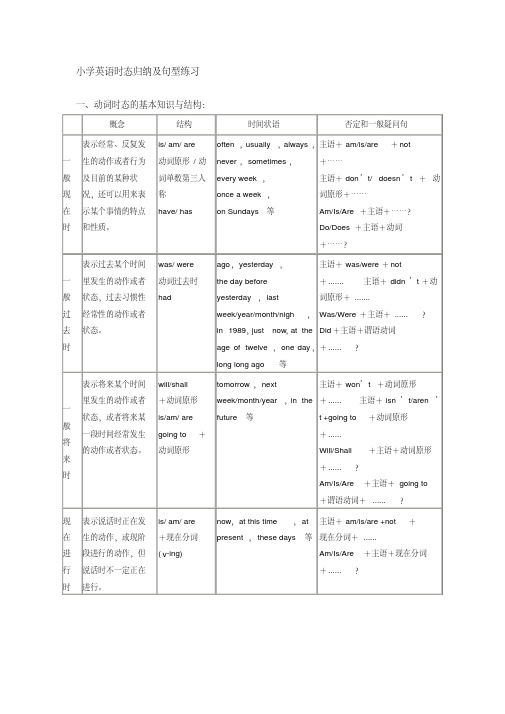
现 表示说话时正在发 is/ am/ are 在 生的动作,或现阶 +现在分词 进 段进行的动作,但 ( v-ing) 行 说话时不一定正在 时 进行。
now,at this time , at 主语+ am/is/are +not + present , these days 等 现在分词+ ......
ago,yesterday ,
主语+ was/were + not
the day before
+ ....... 主语+ didn ’t +动
yesterday , last
词原形+ .......
week/year/month/nigh , Was/Were +主语+ ...... ?
in 1989,just now,at the Did +主语+谓语动词
_____________________________________________ 31. Lily and Lucy went ice-skating yesterday.
___________________________________________________ 32. It`s seven o`clock.
34. I am interested in swimming. ______________________________________________________ 35. Mike is a student in Grade Six. ______________________________________________________ 36. Tom enjoys listening to the music ______________________________________________________ 37.He came to visit China two days ago( 两天前 ). ______________________________________________________ 38. I can speak English well. ______________________________________________________ 39. Tony had a talk for a long time. ______________________________________________________ 40. Jim and Kate often help their grandfather on the farm after school. ______________________________________________________ 41.I am good at( 擅长 ) singing and dancing. ______________________________________________________ 42. He wants to be an actor in the future. ______________________________________________________ 43.We should take care of the young trees. ______________________________________________________ 44. The girls are singing in the classroom. ______________________________________________________ 45. She has something to eat. ______________________________________________________ 46. Alice came to our home last week( 上一周 ). ______________________________________________________ 47. The little boy is standing on the man's shoulders. ______________________________________________________ 48.There is some fruit juice in the glass. ______________________________________________________ 59. We will visit America next week( 下一周 ). ______________________________________________________ 50.She is going to be a middle school student. ______________________________________________________
(完整版)小学英语时态练习及试题
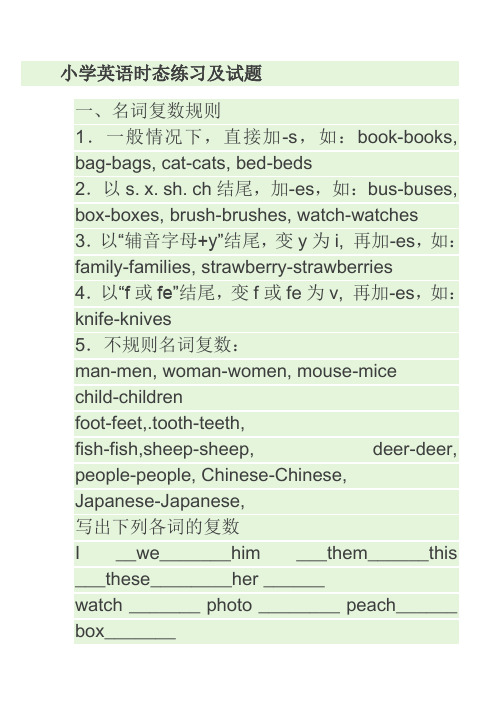
小学英语时态练习及试题一、名词复数规则1.一般情况下,直接加-s,如:book-books, bag-bags, cat-cats, bed-beds2.以s. x. sh. ch结尾,加-es,如:bus-buses, box-boxes, brush-brushes, watch-watches 3.以“辅音字母+y”结尾,变y为i, 再加-es,如:family-families, strawberry-strawberries4.以“f或fe”结尾,变f或fe为v, 再加-es,如:knife-knives5.不规则名词复数:man-men, woman-women, mouse-micechild-childrenfoot-feet,.tooth-teeth,fish-fish,sheep-sheep, deer-deer, people-people, Chinese-Chinese,Japanese-Japanese,写出下列各词的复数I __we_______him ___them______this ___these________her ______watch _______ photo ________ peach______ box_______day________ book_______ dress ________ strawberry _____man______ woman_______ child _______ sheep ______ foot________ tooth_______ 二、一般现在时一般现在时基本用法介绍【No. 1】一般现在时的功能1.表示事物或人物的特征、状态。
如:The sky is blue.天空是蓝色的。
2.表示经常性或习惯性的动作。
如:I get up at six every day.我每天六点起床。
3.表示客观现实。
如:The earth goes around the sun.地球绕着太阳转。
小学英语语法大全(附练习题)

第一章名词1.名词的数2.名词的格第二章代词1.人称代词2.物主代词第三章冠词与数词1.冠词2.数词第四章一般现在时态第五章现在进行时态第六章句型1.陈述句2.疑问句3.祈使句4.There be 句型与have\ has第七章总结考试第一章名词(Noun)名词的概念在生活中,我们会接触到各种各样的人和事物,用来表示这些人或事物名称的词就是名词。
一、名词的数名词的数指名词的单数和复数形式。
可数名词表示“一个”时用单数,“两个以上”时用复数;不可数名词表示量时,通常用“数词+单位+of+物质名词”的形式,如 a piece of bread (一片面包),变为复数时,只须将单位名词变为复数,如:two pieces of bread(两片面包)。
*名词复数的构成法则1. 一般情况下在词尾加s. 词尾读音shop --- shops (商店) 在清辅音后读[ s ]bag --- bags (书包) 在浊辅音后读[ z ]window --- windows (窗户) 在元音后读[ z ]2. 以s, x, sh, ch 结尾的单词在词尾加es。
class --- classes (班级) 词尾读音[ iz ]box --- boxes (盒子)match --- matches (比赛)brush --- brushes (刷子)3. 以“辅音字母+y” 结尾的词,变y为i 加es.story --- stories (故事) 词尾读音[ iz ]4. 以“元音字母+y” 结尾的词,在词尾直接加skey --- keys 词尾读音[ z ]monkey --- monkeys5.以“o” 结尾的名词,复数一般在词尾加“s”, 但个别加“es”tomato --- tomatoes (西红柿) 词尾读音[ z ]potato --- potatoes (土豆)zoo --- zoos (动物园)photo --- photos (照片)*(以“o”结尾,复数加“es”)口诀:黑人(Negro)英雄(hero),左手拿着西红柿(tomato),右手拿着破土豆(potato),头顶一个大芒果(mango)。
完整版)小学英语四大时态总结及练习题
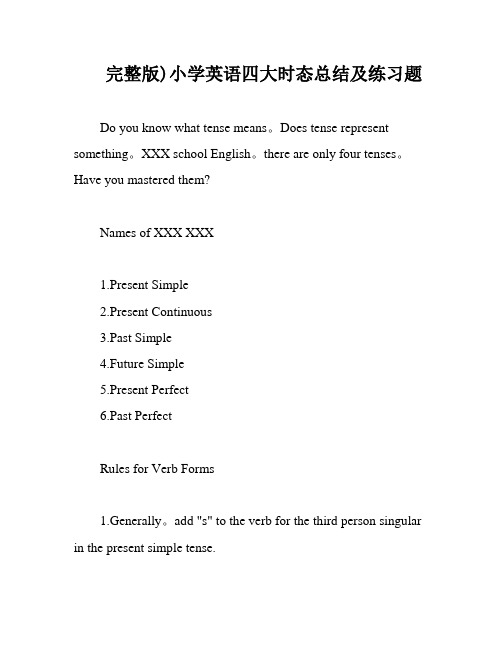
完整版)小学英语四大时态总结及练习题Do you know what tense means。
Does tense represent something。
XXX school English。
there are only four tenses。
Have you mastered them?Names of XXX XXX1.Present Simple2.Present Continuous3.Past Simple4.Future Simple5.Present Perfect6.Past PerfectRules for Verb Forms1.Generally。
add "s" to the verb for the third person singular in the present simple tense.2.For verbs ending in ch。
sh。
s。
or x。
add "es" to the verb for the third person singular in the present simple tense.3.For verbs ending in o。
add "es" to the verb for the third person singular in the present simple tense.4.For verbs XXX "y," change the "y" to "i" and add "es" to the verb for the third person singular in the present simple tense.5.For irregular verbs。
there is no specific rule.6.Generally。
小学英语四大时态总结(附小升初时态考题)

4. 以o结尾的单词: 有生命加s 。
tomato-tomatoespotato-potatoes无生命加espiano-pianosphoto-photoszoo-zoosradio-radios小升初时态专题综合训练1.(成都市青羊区小学毕业卷)John _____ football.A. likes playingB. likes playC. like play2.(深圳市龙岗区小学毕业卷)Does your mother _____ football?A. likeB. likesC. like play3.(芜湖市第三中学招生卷)They usually _____ TV in the evening.A. watchB. will watchC. are watchingD. watches4.(上海市奉贤区小学毕业卷)—What do you usually do on the weekend?—I often ____.A. do my homeworkB. did my homeworkC. doing my homework5. (杭州市西湖区小学毕业卷)I don’t like _____ thril lers(恐怖片)______ playing baseball.A. watching; orB. watching; andC. to watch; or6.(菏泽市晨曦中学招生卷)Bob often _____ to school.A. walkB. walksC. walked7.(南昌铁路一中初中部招生卷)My pen ______ on my desk ten minutes ago.But it _____ there now.A. is; isn’tB. was; isn’tC. is; is8.(长沙市宁乡县小学毕业卷)Mike is _____ after his classmates.A. runsB. runingC. running9.(桂林市奎光学校招生卷)Be quiet! The babies ________.A. sleepB. are sleepingC. slept10. (武汉市青山区小学毕业卷)______ he _____ his homework yesterday?A. Does; doB. Did; didC. Did; do11(北京市朝阳区小学毕业卷)—What did you do last weekend?—I ______.A. go swimmingB. did my homeworkC. went swim12.(芜湖市第十一中学招生卷)—What’s your hobby?—_____ is my hobby.A. Collecting stampsB. Collect stampsC. Stamps13.(广州市白云区小学毕业卷)—Where were you just now?—I _____ at school.A. isB. wasC. were14.(武汉市青山区小学毕业卷)______ he ______ his grandparents lastmonth?A. Did; visitedB. Did; visitC. Do; visited15.(郑州市二七区小学毕业卷)Last week, we _____ a _____ race.A. hard; runningB. have; runningC. had; running16.(福州市仓山区小学毕业卷)I______ to the park last week.A. goB. wentC. going17.(合肥市蜀山区小学毕业卷)If I _____ you tomorrow, I will give youthe receipt(收据)。
小学3-6年级英语常考八种时态归纳复习,附赠小升初英语练习题
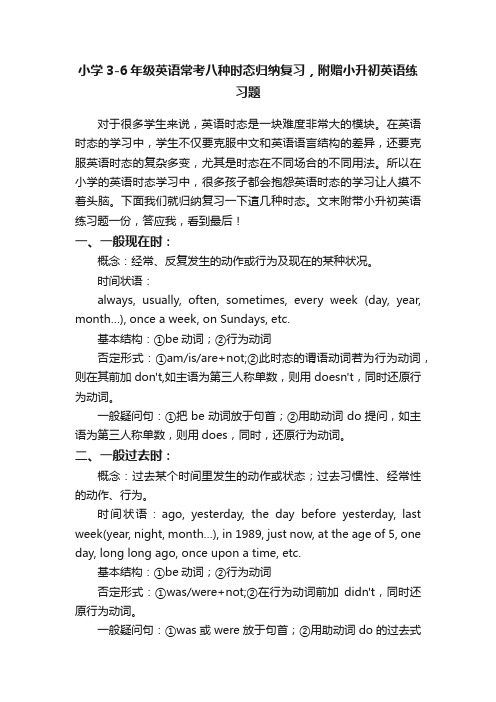
小学3-6年级英语常考八种时态归纳复习,附赠小升初英语练习题对于很多学生来说,英语时态是一块难度非常大的模块。
在英语时态的学习中,学生不仅要克服中文和英语语言结构的差异,还要克服英语时态的复杂多变,尤其是时态在不同场合的不同用法。
所以在小学的英语时态学习中,很多孩子都会抱怨英语时态的学习让人摸不着头脑。
下面我们就归纳复习一下這几种时态。
文末附带小升初英语练习题一份,答应我,看到最后!一、一般现在时:概念:经常、反复发生的动作或行为及现在的某种状况。
时间状语:always, usually, often, sometimes, every week (day, year, month…), once a week, on Sundays, etc.基本结构:①be动词;②行为动词否定形式:①am/is/are+not;②此时态的谓语动词若为行为动词,则在其前加don't,如主语为第三人称单数,则用doesn't,同时还原行为动词。
一般疑问句:①把be动词放于句首;②用助动词do提问,如主语为第三人称单数,则用does,同时,还原行为动词。
二、一般过去时:概念:过去某个时间里发生的动作或状态;过去习惯性、经常性的动作、行为。
时间状语:ago, yesterday, the day before yesterday, last week(year, night, month…), in 1989, just now, at the age of 5, one day, long long ago, once upon a time, etc.基本结构:①be动词;②行为动词否定形式:①was/were+not;②在行为动词前加didn't,同时还原行为动词。
一般疑问句:①was或were放于句首;②用助动词do的过去式did 提问,同时还原行为动词。
三、现在进行时:概念:表示现阶段或说话时正在进行的动作及行为。
小学英语单词分类+语法时态汇总(附练习题)
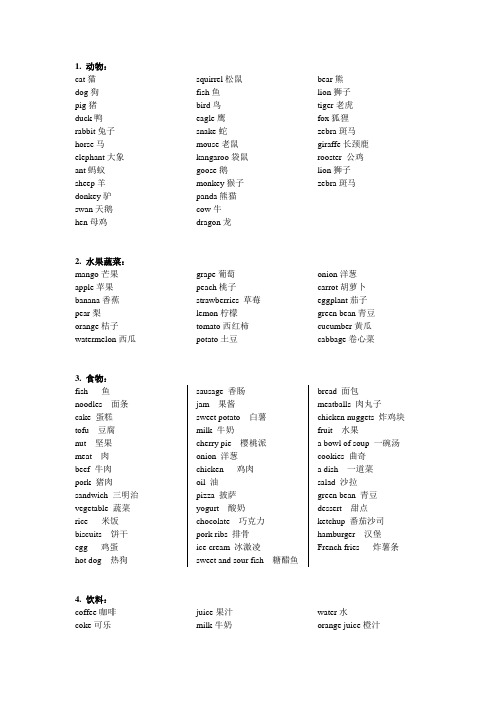
1. 动物:cat猫dog狗pig猪duck鸭rabbit兔子horse马elephant大象ant蚂蚁sheep羊donkey驴squirrel松鼠fish鱼bird鸟eagle鹰snake蛇mouse老鼠kangaroo袋鼠goose鹅monkey猴子panda熊猫bear熊lion狮子tiger老虎fox狐狸zebra斑马giraffe长颈鹿rooster 公鸡lion狮子zebra斑马swan天鹅hen母鸡cow牛dragon龙2. 水果蔬菜:mango芒果apple苹果banana香蕉pear梨orange桔子watermelon西瓜grape葡萄peach桃子strawberries 草莓lemon柠檬tomato西红柿potato土豆onion洋葱carrot胡萝卜eggplant茄子green bean青豆cucumber黄瓜cabbage卷心菜3. 食物:fish 鱼noodles 面条cake 蛋糕tofu 豆腐nut 坚果meat 肉beef 牛肉pork 猪肉sandwich 三明治vegetable 蔬菜rice 米饭biscuits 饼干egg 鸡蛋hot dog 热狗sausage 香肠jam 果酱sweet potato 白薯milk 牛奶cherry pie 樱桃派onion 洋葱chicken 鸡肉oil 油pizza 披萨yogurt 酸奶chocolate 巧克力pork ribs 排骨ice cream 冰激凌sweet and sour fish 糖醋鱼bread 面包meatballs 肉丸子chicken nuggets 炸鸡块fruit 水果a bowl of soup 一碗汤cookies 曲奇a dish 一道菜salad 沙拉green bean 青豆dessert 甜点ketchup 番茄沙司hamburger 汉堡French fries 炸薯条4. 饮料:coffee咖啡coke可乐juice果汁milk牛奶water水orange juice橙汁beer啤酒tea茶5. 交通工具:bike自行车bus公共汽车train火车boat小船ship轮船yacht快艇car小汽车jeep吉普车plane飞机subway地铁taxi出租车spaceship宇宙飞船6. 颜色:red红色blue蓝色yellow黄色orange橘色green绿色pink粉色black黑色white白色brown棕色grey灰色purple紫色silver银色7. 学习用品:computer电脑knife小刀pen钢笔pencil铅笔pencil-case铅笔盒pencil-box铅笔盒ruler尺子book书bag书包newspaper报纸schoolbag书包eraser橡皮math book数学书sharpener转笔刀storybook故事书notebook笔记本English book英语书crayon蜡笔Chinese book语文书8. Family Tree家庭成员之间的关系mother母亲father父亲sister姐妹brother兄弟son儿子daughter女儿uncle叔叔aunt阿姨dad爸爸mom妈妈grandfather祖父grandmother祖母grandpa爷爷grandma奶奶cousin堂兄弟姐妹nephew侄子niece侄女9. 用来形容某人的词汇:“He is kind.”(他是善良的。
小学英语语法归纳总结(时态综合练习)

小学英语语法归纳总结(时态综合练习)小学英语语法归纳总结及综合练习一、名词1、写出下列各词的复数。
I _________ him _________ this _______ her ______ watch _______ tomato_______child _______ photo ________ diary ______ day________ foot________ dress ________ tooth_______sheep ______ box_______ strawberry _____ thief _______ engineer______ peach______sandwich ______ man______ woman_______ leaf_______ people________2、用所给名词的正确形式填空。
(1)Are there two ( box ) on the table?(2)I can see some ( people ) in the cinema.(3)How many ( day ) are there in a week?(4)Here’re five( bottle ) of ( juice ) for you.(5)This ( violin ) is hers. Those ( grape ) are over there.二、冠词1、用a或an填空。
____ “U” ____ ice-cream ____ goalkeeper ____ teapot ____apple____office ____English book ____umbrella ____unit ____hour2、根据需要,填写冠词a,an或the。
(1)Who is ____girl behind ____tree?(2)____old man has two children, ____ son and ____daughter.(3)This is ____ orange. ____ orange is Lucy’s.(4)He likes playing ____guitar. We have ____same hobby.(5)We all had____good time last Sunday.(6)She wants to be____doctor.三,数词1、请翻译下列短语。
小学英语时态汇总及练习题

小学英语一般现在时一. 意义:表示经常发生的事情,动作或存在的状态二. 构成及变化1.be动词的变化。
肯定句:主语+be(am,is,are)+其它。
如:I am a boy.我是一个男孩。
否定句:主语+ be + not +其它。
如:He is not a worker.他不是工人。
一般疑问句:Be +主语+其它。
如:-Are you a student?-Yes. I am. / No, I'm not.特殊疑问句:疑问词+一般疑问句。
如:Where is my bike?2. 行为动词的变化。
l、当主语为第一,二人称及复数时,助动词为do肯定句:主语+动词原形(+其它)。
如:We often play basketball after school.否定句:主语+ don't+动词原形(+其它)。
如:we don’t play basketball after school. 一般疑问句:Do +主语+动词原形+其它?如: Do you often play basketball after school l? Yes, we do. / No, we don't. 特殊疑问句:疑问词+以do开头的一般疑问句?如: What do you often do after school ?2、当主语为第三人称单数时 ,助动词为does肯定句:主语+动词三单式(+其它)。
如: He swims well.否定句:主语+ doesn’t+动词原形(+其它)。
如:He doesn’t swim well..一般疑问句:Does +主语+动词原形+其它?如:Does he swim well ?Yes, he does. / No, he doesn't.特殊疑问句:疑问词+以does开头的一般疑问句?如: How does your father go to work?三.第三人称单数的动词变化规则(只有在第三人称为主语的肯定句中,动词才用三单式)(1)多数动词直接加s:runs gets likes collets takes plays climbs…….(2)结尾是s, x, sh, ch, o,前为辅音字母,结尾加es :watches teaches goes does washes crosses mixes brushes(3)动词末尾y前为辅音:将y改为i加es:study→studies fly→flies carry→carries cry→cries但在y前如果为元音则直接加s: buys says四.时间标志:always , usually , often , sometimes ,every…一般现在时练习题一.用下列单词的适当形式填空1.We often___________(play) in the playground.2.He _________(get) up at six o’clock.3.__________you _________(brush) your teeth every morning?4.What___________(do) he usually__________(do) after school?5.Danny ____________(study) English, Chinese, maths at school.6.Mike sometimes __________(go) to the park with his sister.7.At eight at night, she __________(watch) TV with his parents.8.________ Mike________(read) English every day?9.How many lessons________your classmates________(have) on Monday?10.What time_________his mother_________(do) the housework?二.改句子1.Do you often play football after school? (改为肯定句)2.I have many books.(改为否定句)3.Gao Shan’s sister likes playing table tennis (改为否定句)4.She lives in a small town near New York.(改为一般疑问句)5.I watch TV every day.(改为一般疑问句)6.We have four lessons.(改为否定句)7.Nancy doesn’t run fast (改为肯定句)8.My dog runs fast.(改为否定句和一般疑问句)9.Mike has two letters for him . (改为否定句和一般疑问句)10.I usually play football on Friday afternoon.否定句:一般疑问句:划线提问11.Su Yang usually washes some clothes on Saturday.否定句:一般疑问句:划线提问:12.Mingming usually waters the flowers every day.否定句:一般疑问句:13.Tom does his homework at home.否定句:一般疑问句:三、用所给动词的真确形式填空1.I like ____________ (swim).2.He _________(read) English every day.3.We _________(go)to school at seven in the morning.4.Mike________(go)to school at seven in the morning.5.My mother________(like) ______(go) shopping.6.I can ________(draw)many beautiful pictures.7.She_________(make) a model plane.8.Do you ________(like)_________(run)?9.Does he_________(like)_________(jump) ?10.Does Nancy_________(grow)flowers on Saturday ?11.The teachers________(like)___________(dance).12.The teacher________(like)____________(dance).13.The students___________(speak) English in class.14.The student_________(speak) Chinese after class.15. Let’s____________and play football . ( go )16. He_____________ like swimming . ( not )17. I’m sorry ____________that . ( hear )18. Wang Bing is____________ ( write ) an E-mail to his friend .19. He has_____________a headache . ( get )20. ______you study English at school ? Yes , I________. ( do )21. _____your sister study English at school ? No , she____ . ( do )22. I’m _________ better . ( feel )23. Why__________Tom absent today ? ( be )一般过去时①意义: 表示过去的事实或状态。
- 1、下载文档前请自行甄别文档内容的完整性,平台不提供额外的编辑、内容补充、找答案等附加服务。
- 2、"仅部分预览"的文档,不可在线预览部分如存在完整性等问题,可反馈申请退款(可完整预览的文档不适用该条件!)。
- 3、如文档侵犯您的权益,请联系客服反馈,我们会尽快为您处理(人工客服工作时间:9:00-18:30)。
star 五角星形
thirty 三十 forty 四十 fifty 五十 sixty 六十 seventy 七十 eighty 八十 ninety 九十 hundred 百 thousand 千
sixth 第六 seventh 第七 eighth 第八 ninth 第九 tenth 第十
4 / 11
10. 体貌特征 。 “ He is tall and strong .”(他 高大 而 强壮 。)还有一些词语是: beautiful (美 丽的), dirty (脏的), fat (肥胖的), healthy (健康的), little (小的), old(年老的),
pretty (漂亮的), short (矮的), thin (瘦的), ugly (难看的), young (年轻的)。 11. 职业 “He is a lawyer (律师) .”。其他表示职业的单词还有: cook(厨师), dentist (牙科医生), doctor (医生), driver (驾驶员), engineer (工程师), farmer (农民),
bread 面包 meatballs 肉丸子 chicken nuggets 炸鸡块 fruit 水果 a bowl of soup 一碗汤 cookies 曲奇 a dish 一道菜 salad 沙拉 green bean 青豆 dessert 甜点 ketchup 番茄沙司 hamburger 汉堡 French fries 炸薯条
neck 脖子 tooth 牙齿 foot 足 head 头 face 脸 hair 头发
21. 人的心理感受
happy 高兴的,开心的 glad 高兴的 angry 生气的
22. 患病、身体不舒服
ill 有病的 sick 有病的 fever 发烧 hurt 受 cold 感冒 23. 乐器: flute 笛子 violin 小提琴
nose 鼻子 mouth 嘴 eye 眼睛 ear 耳朵 arm 胳膊 hand 手
sad 悲伤的 tired 累的 interested 感兴趣的
finger 手指 leg 腿 knee 膝盖 toe 脚趾
afraid 害怕的 excited 兴奋的
cough 咳嗽 sore throat 嗓子疼 a runny nose 流鼻涕 flu 流感 toothache 牙疼
mother 母亲
uncle 叔叔
father 父亲
aunt 阿姨
sister 姐妹
dad 爸爸
brother 兄弟
mom 妈妈
son 儿子
grandfather 祖父
daughter 女儿
grandmother 祖母
brown 棕色 grey 灰色 purple 紫色 silver 银色
schoolbag 书包 eraser 橡皮 math book 数学书 sharpener 转笔刀
Chinese book 语文书
grandpa 爷爷 grandma 奶奶 cousin 堂兄弟姐妹 nephew 侄子 niece 侄女
9. 用来形容某人的词汇:
“ He is kind .”(他是 善良的 。)clever(聪明的) ,cute(可爱的) ,dangerous(危险的) ,
famous(著名的) fine(美好的) ,funny (有趣的) ,great(了不起的) ,lovely(可爱的) , nice(和蔼的), shy(害羞的), slow(迟钝的), smart (聪明的)和 wonderful (奇妙 的)。
beer 啤酒 tea 茶
plane 飞机 subway 地铁 taxi 出租车 spaceship 宇宙飞船
- 1 - / 11
6. 颜色:
red 红色
green 绿色
blue 蓝色
pink 粉色
yellow 黄色
black 黑色
orange 橘色
white 白色
7. 学习用品:
computer 电脑
18. 服饰: jacket 夹克衫 shirt 衬衫 T-shirt T 恤衫 skirt 短裙 dress 连衣裙 jeans 牛仔裤 socks 袜子 shoes 鞋 sweater 毛衣
19. 职业 :
teacher 教师 student 学生 doctor 医生 nurse 护士 driver 司机
14. 方位: east 东
15. 餐具: plate 盘子 knife 刀 16. 地点: home 家 room 房间 bedroom 卧室 bathroom 浴室 living room 客厅 kitchen 厨房 washroom 洗手间 study 书房 classroom 教室 library 图书馆 bookstore 书店 playground 操场 gym 体育馆 17. 国家、城市: China America/US/USA Britain/UK
England Canada Australia
pot 锅 chopsticks 筷子
cinema 电影院 museum 博物馆 park 公园 amusement park 游乐园 theme park 主题公园 zoo 动物园 supermarket 超市 gas station 加油站 the Great Wall 长城 the Summer Palace 颐和园 the Palace Museum 故宫
coach(教练) , teacher (教师) , barber (理发师) , tour guide (导游) , writer (作家)。
12. 体育用品:
ball 球
ping-pong 乒乓
golf 高尔夫
basketball 篮球
table tennis 乒乓球
rugby 橄榄球
volleyball 排球
1. 动物: cat 猫 dog 狗 pig 猪 duck 鸭 rabbit 兔子 horse 马 elephant 大象 ant 蚂蚁 sheep 羊 donkey 驴 swan 天鹅 hen 母鸡 2. 水果蔬菜: mango 芒果 apple 苹果 banana 香蕉 pear 梨 orange 桔子 watermelon 西瓜 3. 食物: fish 鱼 noodles 面条 cake 蛋糕 tofu 豆腐 nut 坚果 meat 肉 beef 牛肉 pork 猪肉 sandwich 三明治 vegetable 蔬菜 rice 米饭 biscuits 饼干 egg 鸡蛋 hot dog 热狗 4. 饮料: coffee 咖啡 coke 可乐 juice 果汁 5. 交通工具: bike 自行车 bus 公共汽车 train 火车 boat 小船
back 后背
- 3 - / 11
cap 鸭舌帽 tie 领带 scarf 围巾 gloves 手套 suit 套装 uniform 校服 blouse 女士衬衫 pants 长裤
pilot 飞行员 barber 理发师 lawyer 律师 professor 大学教授 coach 教练
heart 心脏
27. 季节 (season) spring 春天 summer 夏天 autumn / fall 秋天 winter 冬天 28. 星期( week ) Sunday 星期日 Monday 星期一 Tuesday 星期二 Wednesday 星期三 Thursday 星期四 Friday 星期五 Saturday 星期六 weekend 周末
sausage 香肠 jam 果酱 sweet potato 白薯 milk 牛奶 cherry pie 樱桃派 onion 洋葱 chicken 鸡肉 oil 油 pizza 披萨 yogurt 酸奶 chocolate 巧克力 pork ribs 排骨 ice cream 冰激凌 sweet and sour fish 糖醋鱼
24. 形状 circle 圆 diamond 菱形 square 正方形 25. 数词 one 一 two 二 three 三 four 四 five 五 six 六 seven 七 eight 八 nine 九 ten 十
26. 序数词 first 第一 second 第二 third 第三 fourth 第四 fifth 第五
squirrel 松鼠 fish 鱼 bird 鸟 eagle 鹰 snake 蛇 mouse 老鼠 kangaroo 袋鼠 goose 鹅 monkey 猴子 panda 熊猫 cow 牛 dragon 龙
grape 葡萄 peach 桃子 strawberries 草莓 lemon 柠檬 tomato 西红柿 potato 土豆
milk 牛奶 water 水 orange juice 橙汁
ship 轮船 yacht 快艇 car 小汽车 jeep 吉普车
bear 熊 lion 狮子 tiger 老虎 fox 狐狸 zebra 斑马 giraffe 长颈鹿 rooster 公鸡 lion 狮子 zebra 斑马
onion 洋葱 carrot 胡萝卜 eggplant 茄子 green bean 青豆 cucumber 黄瓜 cabbage 卷心菜
piano 钢琴 drum 鼓
headache 头疼 earache 耳朵疼 backache 腰疼 stomachache 胃疼 pill 药片,药丸
guitar 吉他
rectangle 长方形 triangle 三角形 heart 心形
eleven 十一 twelve 十二 thirteen 十三 fourteen 十四 fifteen 十五 sixteen 十六 seventeen 十七 eighteen 十八 nineteen 十九 twenty 二十
